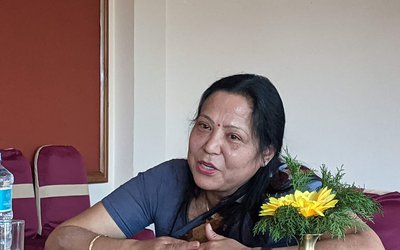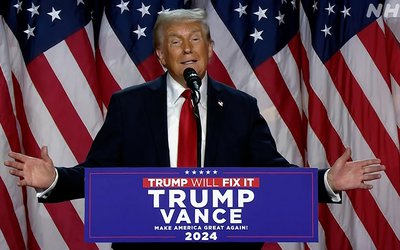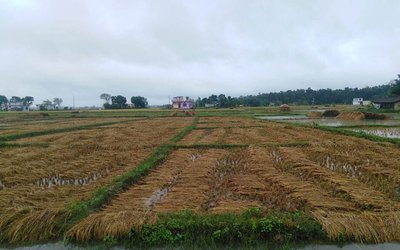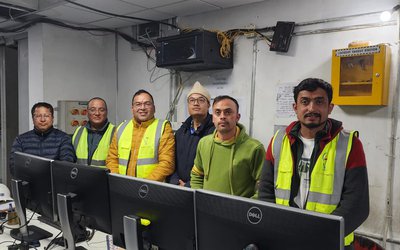At a time when Nepal has been passing through a very critical political situation, International IDEA's Regional director ANDREW ELLIS was recently in Nepal. Andrew Ellis spoke to NEW SPOTLIGHT on various issues on his rich experiences of countries on transition. Excerpts:
Since Nepal has been passing through a critical political phase following the dissolution of Constituent Assembly, as an international expert how do you view the new situation?
I get very different impressions fromtalking to people from different parts of the political spectrum: there does not seem to be a common understanding of the constitutional and legal position. But after CA did not reach agreement and dissolved, people still want to move forward. The lesson we learn from the transition in general isthe need to respond to a continuing story of uncertainty.There is a need for broad political understanding and consensus behind whatever solution or whatever track people take. Perhaps there are quite a range of options. The most important thing toguarantee the legitimacy of any particular option is that the political players, stakeholders and citizens regard a solution or way forward as sustainable and legitimate.
There are two lines of thinking. One group of people arguing for dismissal of this government and others arguing that there is no role for the president to do so. How do you suggest the way to end the deadlock?
As long there is disagreementand lack of political consensus, then presumably the situation will remain in deadlock. I would not as a matter of principle, as the regional director of an international organizationlooking at the situation from outside, take a viewthat either of these options - or indeed any other option- is necessarily the correct way forward. It is up to different Nepali stakeholders - both the players who are directly involved on the two sides of that argument and others who are concerned with the future direction and framework for democratic Nepal - to find asolution which everybody is happy to take forward or at least everybodyis happy to live with taking forward.
Given international experiences, are these kinds of situations part of a normal process or special only to Nepal?
All transitions are unique because all countries are different. This is a basic understanding necessary to working in democracy building and democracy support. You cannot import directly the experiences of any country to another, just unloading it from a box andassembling to use it exactly as it is used somewhere else.
There have been transitions that have taken a significant period of time before. It probably took fifteen to twenty years for Mexico to move fully from the one party authoritarian state of PRI of the 1980s to the multi-party democratic presidential system it has now.It took Indonesia six years from the big reform movement of 1998 through to the first free, credible and legitimate elections under the new and strongly amended constitution in 2004. The experience thattransition is taking a long time is not unusual.
In addition, when a process of change is unsuccessful, what usually follows first is disappointment and recrimination. It may take a little while for the talking to start again and the momentum to build to create another window of opportunity for progress.
When there is a vacuum like Nepal’s without legislature, there is different opinion about the role of the president. Is there any country in the world which has seen the same kind of situation like in Nepal? Or can judiciary play some sort of a role?
There are many possibilities. There are different experiences in relation to what happens when legislatures are dissolved. There are different experiences in the formalities related to caretaker government and also to the relations between executive and judiciary, which is a matter both of the formal institutional framework and also of precedentsand practical experiences - which differ between different countries. It clearly makes a difference whether the countries are presidential, parliamentary or semi-presidential. In the Nepalese case, the institutions of president as head of the state and prime minister as head of government look semi presidential in form but are very new: so maybe those questions are even more subject to discussion. There is a range of options and experiences from around the world and one of the things that perhaps we can do to assist the process is to help to those who want to codify those experiences and try to learn from them. Even when you have codified that experience, its value is to inform Nepalese actors as they talk about the issue and seek to reacha political consensus. Nobody else can write the definitive structure.
As you said the transition in Mexico and Indonesia took a long time and South Africa quite a long time, do you think Nepal's transition will also go for a longer period of time?
Yes. Transition is always difficult. It is not necessarily something to worry about thatit is taking a long time. There are many examples of transitions where things have got stuck, a particular round of negotiations has ended in failure, and people have to get through the disappointment and blaming each other before they can create another window of opportunity. All of those are established patterns –although it can clearly be worrying if there is deadlock and deadlock, no sign of movement and no new opportunity emerging. That immobility does provide a challenge not only to political stake holders and actors but to the people as a whole.
An international agency likes International IDEA has been supporting Nepal in strengthening democratic process and shorten the transition. In a situation following the CA’s dissolution, how can Nepal get benefits from organizations like International IDEA to overcome the existing situation?
IDEA's global mission is to support locally owned and sustainable democratic change worldwide. After ‘democratic’, in this context the two key elements are perhaps ‘support’ and ‘locally owned’. We or any other international agencies cannot and should not be driving the process to transition. We can support Nepalese political actors who are seeking to take the process of democracy building forward and we can encourage and provide and maybe facilitate through sharing comparative experiences,perhaps bringing peopletogether for dialogue and supporting the process of building up understanding between the different views.Ultimately where the process in Nepal goes is up to Nepalese actors. We are ready to continue to help Nepalese actors from many different viewpointsas they continue the struggle to do so.
How do you observe Nepal's present situation as an outsider?
It clearly is not an easy time at the moment. I am not going to predict how it will go forward partly because Iactually did not know. Even if I did know, it would not be right to do so. But, I hope there is sufficient good will, sufficient commitment, sufficient belief, sufficient investment in building Nepalese democracy to enable the process to go forward and regain the momentum again that we have seen in different times, perhaps looking at new approaches to issues of difference. We are very happy to help and support Nepalese actors as they strive to do that.
From federalism to judiciary and governance to elections, there are so many differences there. One the reason behind the collapse of CA is the conflict of interest among various forces. Do you see some possibility to find a long term constitutional solution in short period of time?
Perhaps one of the things that maybe not so obvious in current thinking is that while there was a disagreement which caused the CA not to complete its tasks, there are also huge ranges of things on which the parties within the CA and other stakeholders and participants have actually all agreed. Had you said ten years ago that an agreement of this kind would possible among such a wide range of Nepalis on such a wide range of things, people would have been surprised and might not have believed you. When such agreement has been achieved following discussions, it may be that people starts thinking of another way forward. I might actually here mention the Indonesian experience, although Indonesia is obviously a very different political structure to Nepal. The process of constitutional change there was handled through the People's Consultative Assembly. There was a committee of that assembly that worked on the process through four years and made recommendations each year. At the end of third year many amendments to the constitution were agreed, but there was argument still on some significant points. Most of the press coverage next day bemoaned the failure to reach a complete agreement. It took somemonths for political stakeholders and indeed wider circles of political discussions to realize just how much had been agreed in that session in 2001! What subsequently happened was that further discussion in 2002 led to a final constitutional amendment, which in turn led to implementing legislation and the2004 elections. It was very much a step by step process, and sometimes perception and reality were not the same.
- SWISS SUPPORT: Construction Of A Trekking Trail In Koshi
- Dec 19, 2024
- PM OLI'S VISIT TO CHINA: BRI Agreement
- Dec 16, 2024
- RASUWAGADHI AND SANJEN: Begin Generation
- Dec 03, 2024
- NEPAL, INDIA ELECTRICITY TRADE Nepal's Advantage
- Dec 02, 2024
- PM Oli'S VISIT TO CHINA: Nepal's Dilemma
- Dec 01, 2024
















